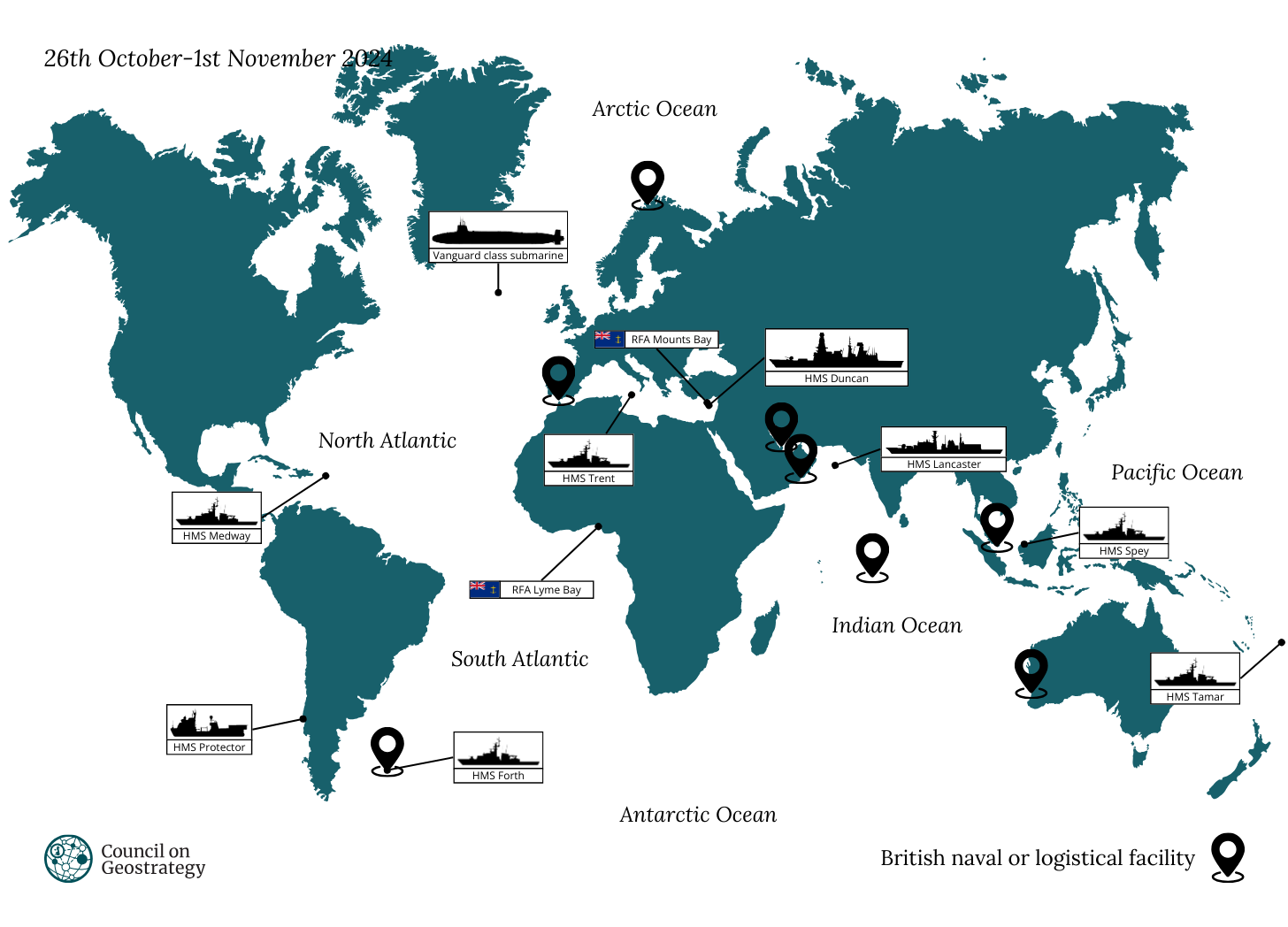Welcome to the 17th Cable, our weekly roundup of British foreign and defence policy.
On 30th October Rachel Reeves, Chancellor of the Exchequer, unveiled the first Labour budget in 14 years, setting out the policy and financial objectives of the new government. His Majesty’s (HM) Government will implement new fiscal rules, raise taxes and increase borrowing to ‘fix the foundations’ of the United Kingdom (UK) by funding public services and increasing investment. But how does the budget stack up in enhancing Britain’s strategic position?
First off, the defence budget received a £2.9 billion increase, but the government did not set a date for reaching the stated target of 2.5% of Gross Domestic Product (GDP). Likewise, British intelligence services will receive an additional £340 million, and HM Government also guaranteed its commitment to provide £3 billion annually to Ukraine.
The budget also laid out plans to increase capital investment by over £100 billion over the coming parliamentary period, while also stating its intention to deliver £20.4 billion for research and development (R&D). The Department for Energy Security and Net Zero (DESNZ) is another winner of the investment hike, with its budget set to increase from £6.4 billion to £14.1 billion for 2025-2026, which will help fund a number of clean energy projects, including carbon capture and storage (CCS), green hydrogen, and nuclear power. This will enhance Britain’s energy security and reduce the country’s emissions in line with official targets.
Key diplomacy
HM Government announced a new set of sanctions on three Russian agencies and senior government figures connected to them. These organisations – including the Social Design Agency (SDA) – have been attempting to undermine and destabilise Ukraine through disinformation campaigns and have tried to incite anti-war protests in several European countries.
The UK has taken the presidency of the United Nations (UN) Security Council for November. This follows Barbara Woodward, UK Permanent Representative to the UN, issuing a statement against Russia’s ongoing war against Ukraine and the use of North Korean troops on the battlefield, in which she called for the Kremlin to end rather than send ‘other countries’ sons to die’ in the conflict.
Catherine West, Under-Secretary of State (Indo-Pacific), condemned North Korea following the regime in Pyongyang launching an Intercontinental Ballistic Missile (ICBM) on 30th October. In a statement, she said:
Unlawful ballistic missile launches are deeply damaging for regional stability and continue to destabilise the peace and security of the Korean Peninsula.
Sir Keir Starmer, Prime Minister, hosted Najib Mikati, his Lebanese counterpart, on 28th October. The two leaders agreed on the urgent need for an immediate ceasefire in Lebanon and a political solution in line with UNSC Resolution 1701. The foreign ministers of Britain, France and Germany followed this by issuing a joint statement on 30th October, calling for the renewal of banking services in Palestinian Territories to prevent the humanitarian situation degrading further.
Defence
A fire broke out at the Royal Navy’s nuclear submarine shipyards in Barrow-in-Furness on 30th October. While emergency services contained the fire and Maria Eagle, Minister for Defence Procurement and Industry, stated that ‘at no point was there any nuclear risk’, the extent of the damage remains uncertain. BAE and the Ministry of Defence (MOD) have announced that an investigation into the fire will take place, but so far, there is no evidence of foul play.
Reaction Engines, a British hypersonic aviation company, has announced that it has gone into administration after talks to secure approximately £20 million in additional funding failed. The company’s collapse will have severe implications for the MOD’s plan to develop a domestic hypersonic missile capability. In August, Reaction Engines reported it had integrated its precooler technology with existing jet-engine components to sustain Mach 3.5 speeds – a significant milestone in the development of reusable high-speed flight.
The Royal Navy has successfully tested ‘cold atom’ quantum sensing technology in a demonstration on HMS Pursuer. Developed by British quantum technology company Aquark Technologies, this new technology will provide advanced sensor capabilities, especially in contested electronic and cyber environments. Cdr. Matthew Steele, who leads future technology development for The Office of the Chief of Technology Officer (OCTO), stated that:
Quantum technologies being developed in the UK will offer an alternative Position, Navigation and Timing (PNT) capability necessary to operate effectively in Global Positioning System (GPS) denied or degraded environments.
Environment and climate
The UN has released a report, which concludes that the world is way off target in cutting greenhouse gas emissions. Analysing the next tranche of Nationally Determined Contributions (NDCs) of countries for 2025 to 2035 – due to be released before the United Nations Climate Change Conferences (COP 30) in Brazil in December 2025 – the report states that:
A failure to increase ambition in these new NDCs and start delivering immediately would put the world on course for a temperature increase of 2.6-3.1°C over the course of this century.
To keep global warming from rising above the target of 1.5°C, the report states that countries need to cut global emissions by 42% by 2030 and 57% by 2035.
How Britain is seen overseas
War on the Rocks released an article analysing the UK-France nuclear security relationship. Outlining the two nuclear powers’ long but often strained relationship in the realm of nuclear cooperation, the article argues that Britain and France ‘are well positioned to improve and deepen nuclear cooperation even further’ given the geopolitical outlook.
How competitors frame Britain
The Global Times published propaganda calling into question British security commitments to the Indo-Pacific. The article claims that while the new government’s recent overtures to Beijing are an improvement over those of the previous Conservative government, Britain continues to seek the containment of the PRC as part of the US strategy in the region. The PRC can hardly imagine that free and open countries will not challenge its attempt to dominate the Indo-Pacific.
Sputnik International released an article claiming that the Barrow-in-Furness naval shipyard fire has badly damaged one of the Royal Navy’s Astute class submarines which is under construction at the facility. The piece alleges that a sand-blaster explosion which ignited flammable materials within the facility caused the fire. These are unsubstantiated claims, which of course Russian state media is more than happy to disseminate. No doubt Russia is eager to deflect attention from the poor state of much of its own navy.
Tracking the Royal Navy’s global deployments
26th October-1st November 2024: Though out of sight, the Royal Navy’s ballistic missile nuclear submarine continued to deter the most severe threats to British interests from the depths of the North Atlantic. HMS Queen Elizabeth returned to Portsmouth after ten days of training in the English Channel. Her sister ship, HMS Prince of Wales also returned home after completing Exercise STRIKE WARRIOR with HMS Dauntless and HMS Iron Duke – supported by RFA Tidespring and RFA Tidesurge. HMS Duncan, supported by RFA Mounts Bay, remained in the Eastern Mediterranean, providing air defence in support of British interests. On the other side of the world, members of the company from HMS Protector – still in Chile – paid tribute to those who died during the Battle of Coronel, while HMS Lancaster paid a routine visit to the Juffair naval facility in Bahrain.
Offshore patrol vessels HMS Forth, HMS Trent, HMS Medway, HMS Spey and HMS Tamar were busy as ever. HMS Forth remained in the Falkland Islands and HMS Medway in the Caribbean, respectively. Meanwhile, HMS Trent remained in Valetta in Malta for maintenance, HMS Spey was forward deployed to Southeast Asia, and HMS Tamar paid a port call to Suva in Fiji.
The Royal Fleet Auxiliary (RFA) also continued to support British interests: RFA Lyme Bay visited Lagos in Nigeria.
How Britain thinks about foreign affairs
With the Budget on 30th October, defence spending re-entered back into the political debate in London. Reeves’ provision of an additional £2.9 billion for defence provides the MOD with another sticking plaster to correct years of insufficient investment in the British Armed Forces. HM Government pledges to increase the defence budget to 2.5% of GDP, though it has set no date to reach this ‘cast iron’ target. According to the previous government’s calculations, meeting the target could deliver an additional £22.5 billion to the military by 2030.
Implications
Britain has often considered defence spending to be a waste. Until the early 20th century, HM Government kept military expenditure as low as possible, except for surges during wartime. In part, this was because the UK did not need a large and expensive army, but it was also because the British economy was so much more productive than the economies of rivals.
With the industrialisation of Germany and Russia in the early 20th century, this began to change. Investment in defence was cranked up, reaching as much as 40%-50% of GDP during the First and Second World Wars. Even during the Cold War, defence spending averaged 6.3% of GDP from 1949 to 1989, falling to 3.1% from 1990 to 2001, 2.5% from 2002 to 2014, before falling to just 2% for much of the rest of the 2010s.
After the Cold War, the UK appears to have seen defence as merely another element of government expenditure, rather than the most important dimension of state investment. True, countries which spend too much on defence often suffer negative effects elsewhere in their economies (i.e., the Soviet Union); but countries which do not spend enough today will almost certainly be forced to invest more tomorrow.
As it contemplates when to reach investing 2.5% of GDP on defence, HM Government should remember: Deterrence is always cheaper than intervention.
Read more: Britain’s hypersonic challenge: Strategic opportunities and risks – William Freer 10/09/2024
How can Britain become more prosperous? - Mann Virdee 27/08/2024
If you found this Cable useful, please subscribe or pledge your support!
What do you think about this Cable? Why not leave a comment below?







I have to disagree with your analysis and statement contained In your 3rd para, "help fund a number of clean energy projects, including carbon capture and storage (CCS), green hydrogen, and nuclear power. This will enhance Britain’s energy security and reduce the country’s emissions in line with official targets."
Apart from a 'truly' Green Hydrogen, these expensive and unproven technologies are diverting investment away from the significantly quicker and cheaper to install and operate renewable alternatives. This is putting necessary CO2 reduction targets out of reach within the required timescale.
The threats, many of which we already experience, associated with the rising levels of atmospheric CO2 are serious and life threatening. A safer option exists with the suspension of any existing and new nuclear facilities, thereby saving countless £billions in decommissioning and waste storage costs being heaped on future generations who will receive NO benefit from their expenditure. Carbon capture is unproven and cannot be installed within the timescale necessary for adequate CO2 reduction.